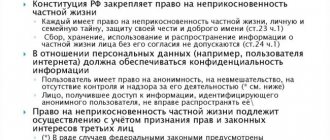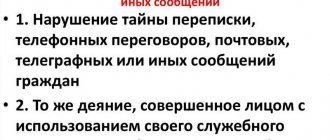Criminal Code of the Russian Federation in the latest edition:
Article 137 of the Criminal Code of the Russian Federation. Violation of privacy
1. Illegal collection or dissemination of information about the private life of a person, constituting his personal or family secret, without his consent, or dissemination of this information in a public speech, publicly displayed work or the media -
shall be punishable by a fine in the amount of up to two hundred thousand rubles, or in the amount of the wages or other income of the convicted person for a period of up to eighteen months, or by compulsory labor for a term of up to three hundred sixty hours, or by corrective labor for a term of up to one year, or by forced labor for a term of up to two years. with deprivation of the right to hold certain positions or engage in certain activities for a term of up to three years or without it, or arrest for a term of up to four months, or imprisonment for a term of up to two years with deprivation of the right to hold certain positions or engage in certain activities for a term of up to three years .
2. The same acts committed by a person using his official position, -
shall be punishable by a fine in the amount of one hundred thousand to three hundred thousand rubles, or in the amount of the wages or other income of the convicted person for a period of one to two years, or by deprivation of the right to hold certain positions or engage in certain activities for a period of two to five years, or by forced labor. for a term of up to four years with deprivation of the right to hold certain positions or engage in certain activities for a term of up to five years or without it, or arrest for a term of up to six months, or imprisonment for a term of up to four years with deprivation of the right to hold certain positions or engage in certain activities for a period of up to five years.
3. Illegal dissemination in a public speech, publicly displayed work, mass media or information and telecommunication networks of information indicating the identity of a minor victim under sixteen years of age in a criminal case, or information containing a description of the physical or physical persons received by him in connection with the crime moral suffering, resulting in harm to the health of a minor, or mental disorder of a minor, or other grave consequences -
shall be punishable by a fine in the amount of one hundred fifty thousand to three hundred fifty thousand rubles, or in the amount of the wages or other income of the convicted person for a period of eighteen months to three years, or by deprivation of the right to hold certain positions or engage in certain activities for a period of three to five years, or forced labor for a term of up to five years with or without deprivation of the right to hold certain positions or engage in certain activities for a term of up to six years, or arrest for a term of up to six months, or imprisonment for a term of up to five years with deprivation of the right to hold certain positions or engage in certain activities certain activities for a period of up to six years.
Return to the table of contents of the document: Criminal Code of the Russian Federation in the latest edition
Lawyer under Art. 137 of the Criminal Code of the Russian Federation Violation of privacy
The right to privacy is guaranteed by the Constitution of the Russian Federation.
However, unfortunately, not all people have read the basic law of the state or are aware that their actions fall under Article 137 of the Criminal Code of the Russian Federation, which provides for liability for violation of privacy. With the advent of the Internet, the number of requests to a lawyer under Art. 137 of the Criminal Code of the Russian Federation has increased many times. It often doesn’t occur to people that the Internet is a mass media where publishing personal photographs or exposing any facts of someone else’s life, especially unpleasant ones, can provoke criminal charges.
What is a violation of privacy?
There is no clear definition in the legislation of what information can be classified as a private or family secret. Perhaps because it is intuitively clear, in addition, almost any information about a non-public person falls under such information.
A violation of the privacy of a person or his family is carried out without his consent:
- collecting, publishing any information or distributing it even to one person;
- use of information in public speeches, published works or media.
A separate clause in the law states that it is inadmissible to disseminate information indicating the identity of a child or teenager who has not reached the age of majority, who has become a victim or has suffered from a crime.
Liability for violation of privacy
The severity of the punishment provided for in Art. 137 of the Criminal Code of the Russian Federation, depends on whether the person used his official position and whether information about the minor was disseminated. The interests of minors are protected most strictly.
For violation of privacy, the most severe punishment is provided, among others - imprisonment for a term of up to 2 years in part one, and up to 5 years in part three, which deals with minors.
Depending on the circumstances of the crime, the personality of the defendant, mitigating and aggravating circumstances, the court may impose other punishments:
- money penalty;
- corrective, compulsory or forced labor;
- arrest.
In addition to other punishment, the court may impose an additional punishment in the form of deprivation of the right to engage in certain types of activities or hold established positions for certain periods.
What is privacy?
This concept means the right of any person to lead a lifestyle that he likes, that suits him according to his worldview, beliefs and moral values.
The principles governing private life are:
- right to inviolability of home;
- the right to non-disclosure of family secrets;
- the right of relatives not to testify against each other;
- the right of every person to organize his life the way he wants;
- right to confidentiality of correspondence;
- right to medical confidentiality;
- the right to freely practice any faith.
Everything that is outside the boundaries of a person’s labor, official or social activities relates to his private life.
Neither the state nor society has the right to invade a person’s private life or regulate it, but only on the condition that it is not illegal.
Protection under Article 137 of the Criminal Code of the Russian Federation Violation of privacy
A charge under Article 137 of the Criminal Code of the Russian Federation often comes as a complete surprise to a person. However, ignorance of the laws does not exempt you from responsibility. Citizens who have reached the age of 16 are held accountable for violating privacy, so even the pranks of schoolchildren can turn into serious problems.
A crime is considered committed immediately upon publication or dissemination of information. In order to avoid saying unnecessary things or committing rash acts in a state of stress after being charged and arrested, it is better to immediately contact a lawyer under Article 137 of the Criminal Code of the Russian Federation.
A lawyer can help the client try to come to an agreement with the victim and reach reconciliation, find some compromise solutions that will help avoid or minimize the consequences of the criminal offense committed.
Privacy: Definition
Regarding this issue, different theorists express different points of view. So, for example, Shershenevich argues that private life is those aspects of human existence that a person wants to make inaccessible to others. Baglay believes that private life is the inner world of a person.
Within the framework of legal realities, private life should be understood as the totality of the following information:
- Correspondence.
- Personal space.
- Family life.
- Information about work, family composition, etc.
Within the framework of various legal acts, other elements are included in the concept of private life. Within the framework of civil legislation, for example, honor, good name, etc. are also protected.
The principle of inviolability
This principle means that information included in this concept cannot be disseminated without the permission of the citizen.
In addition to the citizen’s permission, distribution will also be legal when it is prescribed, for example, in a court decision. The same applies to collecting information about a citizen.







